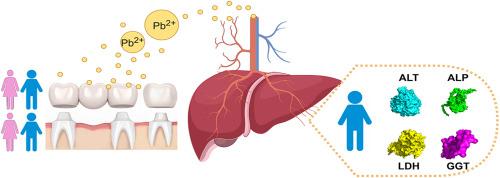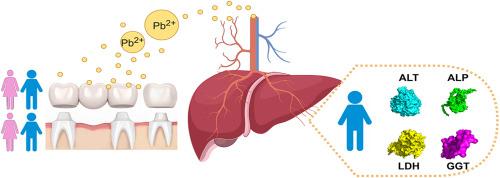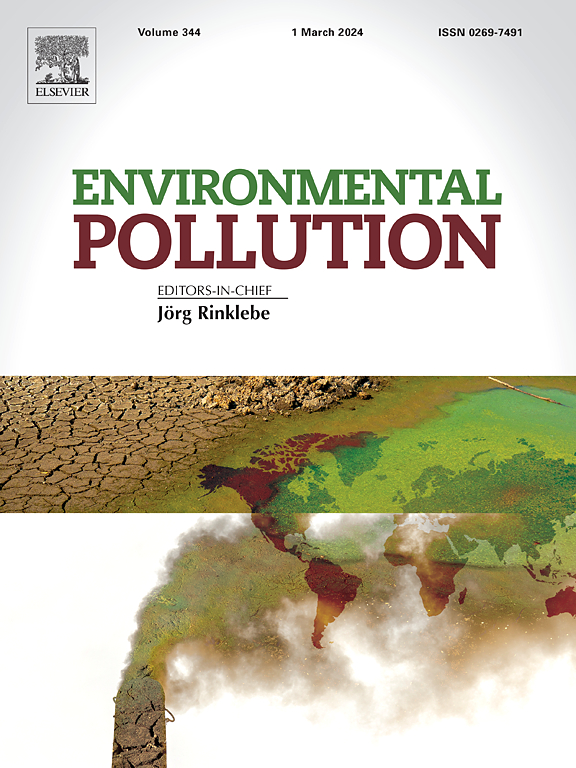The relationship between fixed dental prostheses, blood lead levels, and liver function: Mediating effects and gender differences
IF 7.6
2区 环境科学与生态学
Q1 ENVIRONMENTAL SCIENCES
引用次数: 0
Abstract
Metal alloys, pure titanium, metal-ceramics, and ceramic materials are used for fixed dental prostheses, which contained lead and potentially involved hepatotoxicity. To investigate the connection between fixed dental prostheses, blood lead levels, and liver function. A cross-sectional study enrolled 3624 American adults were conducted. Multivariate linear regression models and smooth curve fittings were used to describe correlations between the number of fixed dental prostheses, blood lead levels, and four liver function markers. Mediation analysis suggested an intermediary association of blood lead levels between prosthesis count and liver function. Here, number of fixed dental prostheses was significantly positive correlated with blood lead levels (p < 0.0001), but specifically negative correlated with alanine aminotransferase, lactate dehydrogenase, and gamma glutamyl transferase levels in males. Moreover, mediation analysis confirmed a mediating role for blood lead levels in the association between the number of prostheses and alanine aminotransferase levels in males only, with a mediation effect rate of 74.27% (p = 0.0020). An increased count of fixed prostheses is associated with changes in liver function markers in a gender-dependent manner, with blood lead levels serving as a potential mediator in males.


固定义齿、血铅水平和肝功能之间的关系:中介效应与性别差异
固定义齿使用金属合金、纯钛、金属陶瓷和陶瓷材料,这些材料中含有铅,可能会引起肝中毒。为了研究固定义齿、血铅水平和肝功能之间的联系。研究人员对 3624 名美国成年人进行了横断面研究。采用多变量线性回归模型和平滑曲线拟合来描述固定义齿数量、血铅水平和四种肝功能指标之间的相关性。中介分析表明,血铅水平与义齿数量和肝功能之间存在中介关联。其中,固定义齿数量与血铅水平呈显著正相关(p < 0.0001),但与男性的丙氨酸氨基转移酶、乳酸脱氢酶和γ谷氨酰转移酶水平呈特殊负相关。此外,中介分析证实,血铅水平在假体数量与丙氨酸氨基转移酶水平之间的关联中只对男性起中介作用,中介效应率为 74.27%(p = 0.0020)。固定假体数量的增加与肝功能指标的变化有性别依赖性,男性的血铅水平是潜在的中介因素。
本文章由计算机程序翻译,如有差异,请以英文原文为准。
求助全文
约1分钟内获得全文
求助全文
来源期刊

Environmental Pollution
环境科学-环境科学
CiteScore
16.00
自引率
6.70%
发文量
2082
审稿时长
2.9 months
期刊介绍:
Environmental Pollution is an international peer-reviewed journal that publishes high-quality research papers and review articles covering all aspects of environmental pollution and its impacts on ecosystems and human health.
Subject areas include, but are not limited to:
• Sources and occurrences of pollutants that are clearly defined and measured in environmental compartments, food and food-related items, and human bodies;
• Interlinks between contaminant exposure and biological, ecological, and human health effects, including those of climate change;
• Contaminants of emerging concerns (including but not limited to antibiotic resistant microorganisms or genes, microplastics/nanoplastics, electronic wastes, light, and noise) and/or their biological, ecological, or human health effects;
• Laboratory and field studies on the remediation/mitigation of environmental pollution via new techniques and with clear links to biological, ecological, or human health effects;
• Modeling of pollution processes, patterns, or trends that is of clear environmental and/or human health interest;
• New techniques that measure and examine environmental occurrences, transport, behavior, and effects of pollutants within the environment or the laboratory, provided that they can be clearly used to address problems within regional or global environmental compartments.
 求助内容:
求助内容: 应助结果提醒方式:
应助结果提醒方式:


